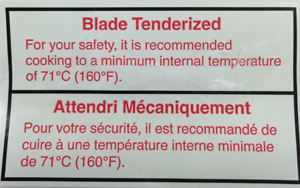What is mechanically tenderized meat?
When meat (e.g., steaks, roasts) is mechanically tenderized, needles or blades pierce the meat to make it more tender and easier to chew. Meat suppliers and sellers, restaurants, and even home cooks do this. The needles or blades may also inject flavour, like marinades.
What are the risks of mechanically tenderized meat?
Your risk of getting sick from mechanically tenderized meat or ground meat is about 5 times higher than from intact (not mechanically tenderized) meat. The risk is even higher for older adults, young children, pregnant women, and people who are already sick. This is because of
E. coli, a type of bacteria found in the intestines of humans and animals.
It’s normal for
E. coli to be on the surface of intact raw meat. The heat from cooking or grilling kills it. With mechanically tenderized meat, the
E. coli gets pushed from the surface of the meat to the inside, where it may not be killed during cooking.
Most types of
E. coli don’t make people sick. But some types, like
E. coli O157:H7, are very harmful to people and can cause:
- pain or cramping in the abdomen
- diarrhea (may be bloody)
- vomiting
- kidney failure
- death
How do I know if meat has been mechanically tenderized?
You can’t tell if meat has been mechanically tenderized by looking at it, because blade and needle marks close up and disappear. When you buy meat, always
check the label—it will say if it’s mechanically tenderized and tell you about safe cooking temperatures.
If you’re at a restaurant, you can ask if the meat is mechanically tenderized and what cooking temperatures are used.

Label on mechanically tenderized meat. It says “blade tenderized” and gives the safe cooking temperature.
Is it safe to cook mechanically tenderized meat rare to medium rare?
No. When meat is mechanically tenderized, harmful E. coli bacteria can get inside the meat. Cooking mechanically tenderized meat (e.g., steaks, roasts) rare to medium rare—below 63°C (145 °F)—isn’t hot enough to kill the bacteria inside.
If meat isn’t mechanically tenderized, is it safe to cook it rare to medium?
Intact meat has bacteria on the surface, but not the inside. You can safely eat intact meat cooked rare to medium if it’s cooked to at least 71°C (160 °F) on the surface. This temperature is hot enough to kill harmful germs.
How can I cook meat safely?
- Always use a food thermometer when cooking meat.
- Cook mechanically tenderized meat (e.g., steaks, roasts) to at least 63°C (145°F) on the inside. Cook ground meat to 71°C (160°F).
- When you cook mechanically tenderized steak, flip it 2 times to cook it evenly.
To get printable posters and labels about raw meat safety, see
Food Facilities: Food Safety Information—E. coli 0157:H7.
